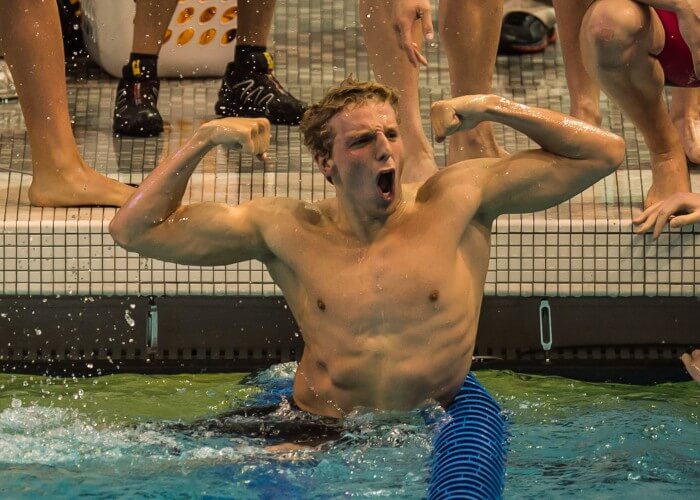3 Ways Swimmers Are Prepared for the Real World

By Courtney Bartholomew, Swimming World College Intern
My swimming career is coming to a close. In 160 days, I will no longer be a student-athlete at the University of Virginia. Who knew four years would go by so quickly? I remember sitting in the pool classroom for my first official team meeting and practice like it was yesterday. Then I was nervous for the future. What would the next four years hold for me?
And now, I am still anxious for the future. However, this case of nerves is different. I feel nervous for life after swimming and college. What will I do? Where will I be? Do I need to learn how to make food other than pasta?
As swimmers, we put the time in the pool year-round, leaving little time for jobs, internships, and experience. So how do we make the most out of our education and our experience of swimming stand out on a resume or in a job interview? I went and talked with Phil Gates, the Life Skills Director for UVa. He assured me that even as student-athletes, we have time for opportunities and have had experiences that will translate to success in the real world.
1. We have developed so many skills (in and out of the pool).
As swimmers, we are able to delay gratification. We have the ability to manage time effectively, to work as an individual, and to work in a team setting. These are important skills to employers and important skills for us to possess in the years beyond swimming.
Swimmers are able to delay gratification for prolonged periods of time. We continuously put in the work knowing that the end goal is still months away and is never guaranteed. However, we know that by putting the work in and paying attention to details, we have the opportunity to accomplish a goal bigger than we have before. To accomplish a goal that you have put endless amounts of energy and time into is an incredible experience unlike any other. This ability to delay gratification is very appealing to employers. This skill displays that someone has the discipline and willpower to work without minor rewards for a larger success at the end.
With the endless amounts of time swimmers put into a pool, we have to be able to manage time well in order to get everything done. We know that in order to accomplish everything during the day, we have to determine when we will be able to do homework, eat dinner, have a social life, and still get to bed at a decent hour. This is an important skill to have because employers are looking for employees who are able to focus on multiple tasks at once, while at the same time putting effort into each thing.
Swimmers also know how to work individually and as a team member. Everyday in practice we are the ones who personally have to put in the work to achieve success and accomplish goals. However, we also have to be able to contribute to a group effort to accomplish team goals. Employers want to know that you will be able to work on a project alone to get the job done, yet at the same time, be able to positively contribute to the group when needed. As a team player, employers know that you will be able to sacrifice individual needs to contribute to the group goal.
2. We have that swimmer’s competitive edge.
The American marketplace is based on competition, and who better to succeed in it than competitors? As swimmers, we compete every single day in the pool. Whether it be competing individually against the clock to go faster in practice, gunning for a best time at a taper meet, competing to win a race for a spot on a national team or to score points for your team in at a championship. We use this competitive edge as motivation to succeed in the pool.
This competitive edge translates into a real world skill. Employers are looking for employees with the motivation to succeed. As swimmers we know that our competitive edge can help us to accomplish goals. The sport of swimming teaches us that to order to have a desired outcome, we need be driven in order to put in the work. How else could we make it through long, grueling practice hours?
3. We know how to learn from our mistakes in order to improve.
The past few weeks have not been easy for me. Between schoolwork, swimming, and personal things going on in my life, I have struggled. However, through my recent struggles I have learned what works for me to be successful and what does not.
Swimming has helped me learn this skill. Every time we race, practice, or analyze video, we can see what works and what does not. The third turn of your 200 might not have been the best, but because you know it was not great, you can go back the next day at practice and work on it. If you have a rough day during practice with times being inconsistent or off of your normal pace, you can look back and see how much sleep you got the night before or if you had enough food in your system.
Not only does this skill apply in the pool, but also is also very applicable to real life situations. A test grade come back that you are not happy with? Next time you might have to study more or take better notes. Similarly with relationships, if it is not working maybe you need to better communication with that person or you need to adjust your relationship.
As swimmers we have a good understanding of the bigger picture, which employers in the real world are looking for. Employers are looking for employees who can learn from their mistakes, and are able to make adjustments to make things better, Gates said.
So next time you start to think about life beyond the sport of swimming, know that the years of dedication and hard work you put in the pool have taught you many invaluable skills that will translate to success in the real world.







hey Lauren Neidigh
Matt Roman Kendal Casey Kendra Crew
Great article!
(and I thought I was delusional)